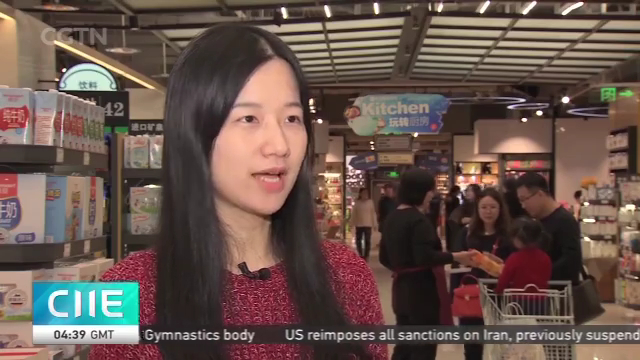
13:27, 06-Nov-2018
Tariff Cuts: Chinese consumers benefit from lower prices
Updated
12:24, 09-Nov-2018
03:10

This year alone China has cut tariffs on international goods on multiple occasions, and consumers across the country are starting to take notice. Xia Ruixue takes a look at how the price tag of some foreign goods, is getting cheaper.
30-year-old Xu Qian is the mother of a 1-and-half-year-old baby. Raising her first child, Xu makes sure that every product she buys for her daughter is foreign-made. She believes they're of better quality and a higher standard when it comes to safety. The price tag however, is often higher than those of their domestic counterparts. But lately, she's finding change.
XU QIAN MOTHER, ZHENGZHOU "Lately, I've noticed that the price of one milk brand produced in New Zealand is getting cheaper. Two yuan for one carton. That's even cheaper than domestic brands. And the prices of some other imported baby products keep going down as well, like clothing."
Many reasons attribute to the lower prices. One of them may be China's recent tariff cuts. On November 1st, a new round of tariff reductions began. Nearly 16-hundred items covered are industrial products and raw materials. The country's overall tariff rate went down to 7.5 percent, from the 9.8 percent in 2017.
QIN BO DIRECTOR OF IMPORT TARIFF DEPT. AT ZHENGZHOU CUSTOMS "According to our statistics, 439 companies in Henan province will benefit from the tariff cuts on November 1st. It's expected that more than 60 million yuan will be saved. It will help save on costs and upgrade the industry."
ZHANG DANDAN PURCHASING MANAGER, DENNIS DEPARTMENT STORE "China keeps reducing its import tariffs since it joined the WTO. And because of its multilateral free trade agreements in the Asia-Pacific region, we can see many zero tariff goods from New Zealand, Australia and Southeast Asian countries. In our supermarkets, we can see more and more cheap foreign goods coming in now."
The latest move was actually the third time this year China reduced tariffs on imported goods. In May, the country placed a zero-tariff policy on cancer medicine, while in July, it lowered tariffs on a number of daily consumer goods, vehicles and auto parts.
YANG SHUYU VICE MANAGER, ZHENGZHOU NISSAN AUTOMOBILE "Zhengzhou Nissan imports auto parts from Japan, Thailand, and other places. So we are really happy to see the tariff cuts on vehicle and auto parts. Since then, we have saved 21 million yuan."
This year marks the 40th anniversary of China's reform and opening up. Reducing import tariffs will help open China's door to the world.
XIA RUIXUE ZHENGZHOU "With similar price points, Chinese customers now have a choice: imported products or domestic ones. In the end, giving people an option will benefit consumers and the country's economy. Xia Ruixue, CGTN, Zhengzhou, Henan province."

SITEMAP
Copyright © 2018 CGTN. Beijing ICP prepared NO.16065310-3
Copyright © 2018 CGTN. Beijing ICP prepared NO.16065310-3